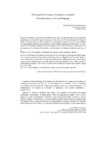Del argot de la droga a la lengua coloquial

Use this link to cite
http://hdl.handle.net/2183/30376
Except where otherwise noted, this item's license is described as Atribución-NoComercial-CompartirIgual 4.0 Internacional (CC BY-NC-SA 4.0)
Collections
Metadata
Show full item recordTitle
Del argot de la droga a la lengua coloquialAlternative Title(s)
From Drug Slang to Coloquial LanguageAuthor(s)
Date
2022-02-02Citation
Rodríguez González, F. (2022). Del argot de la droga a la lengua coloquial. Revista de Lexicografía, 27(1), 153-158. https://doi.org/10.17979/rlex.2021.27.1.8664
Abstract
[Resumen] El objeto de este artículo es doble. Por un lado, examinar los principales cambios de significado que han tenido lugar con algunas voces típicas de la terminología de la droga en español. Por otro, hacer un breve repaso de su nacimiento y evolución en las últimas décadas del siglo pasado a partir de cuatro contextos socioculturales claramente diferenciados: la cultura del LSD en Estados Unidos en los años sesenta, el consumo del hachís y marihuana en los años setenta, de la heroína en los ochenta, y de la cocaína y las drogas de síntesis en los noventa. [Abstract] The object of this article is twofold. On the one hand, to examine the main changes of meaning undergone by some typical drug terms in Spanish. On the other hand, to review their origin and evolution in the last decades of the 20th based on four sociocultural contexts clearly differenciated: the LSD culture in the United States in the 1960s, the use of hachis and marihuana in the 1970s, of heroin in the 1980s, and cocaine and synthetic drugs since the 1990s.
Keywords
Lexicografía
Sociolingüística
Argot
Lengua coloquial
Español
Lexicography
Sociolinguistics
Slang
Coloquial language
Spanish
Sociolingüística
Argot
Lengua coloquial
Español
Lexicography
Sociolinguistics
Slang
Coloquial language
Spanish
Editor version
Rights
Atribución-NoComercial-CompartirIgual 4.0 Internacional (CC BY-NC-SA 4.0)
ISSN
2603-6673
1134-4539
1134-4539






